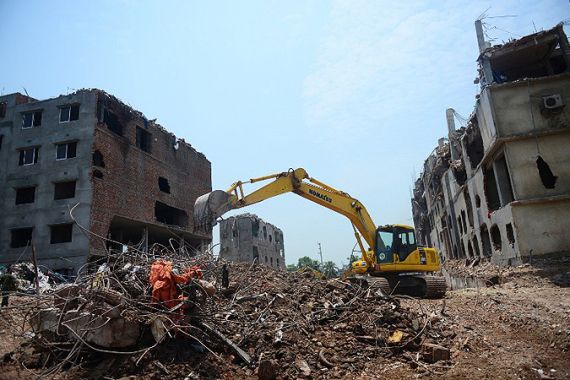Retailers back Bangladesh factory safety pact
Major retailers agree to monitor suppliers and pay for repairs after more than 1,100 dead in factory collapse.

Four of the world’s largest retailers have agreed to a pact to improve safety at some of Bangladesh’s garment factories after a building collapse that killed more than 1,100 workers in the country last month.
H&M, C&A, Primark and the owners of Zara have agreed to monitor suppliers and pay for repairs following the worst industrial disaster in the South Asian country.
Keep reading
list of 4 itemsDesperate scenes as Gaza aid trucks arrive from US floating pier
As Israel attacked Gaza’s north, 26 members of his family were wiped out
What is Trident, the US floating pier off Gaza? Will it work?
The agreement on fire and building safety, which is being led by the International Labour Organisation, trade unions and other lobby groups, has been under negotiation since the Rana Plaza building located near the capital, Dhaka, collapsed on April 24.
It comes as the three week search for survivors ended on Monday and Bangladesh’s cabinet paved the way for parliament to allow garment workers to form trade unions without prior approval from factory owners.
Deadly incidents at factories, including a fire in November that killed 112 people, has focused global attention on safety standards in Bangladesh’s booming garment industry, the world’s biggest exporter of clothing after China.
At least eight people were killed last week when a fire swept through a garment factory in an industrial district of the capital.
German retailer Tchibo also agreed to the plan, according to IndustriALL Global Union, which has been driving the negotiations to get brands to sign up for the agreement.
IndustriALL said it hoped for several more brands to join by a May 15 deadline set after talks in Germany last month with major brands and retailers. IndustriALL declined to comment before Wednesday’s deadline on a total financial commitment for the project, but said “it is a substantial amount, enough to make a difference”.
Financial committment
Swedish fashion retailer H&M, which is a major purchaser of garments from Bangladesh but did not use any of the suppliers operating in the collapsed factory, said the five-year accord would add to its already strict requirements for suppliers.
|
|
| Worker Rights Consortium talks to Al Jazeera |
“We hope for a broad coalition of signatures in order for the agreement to work effectively on ground,” H&M head of sustainability Helena Helmersson said in a statement.
The company said that the agreement would also need to align with an action plan agreed by the Bangladesh government, industry associations and trade unions to reach all 5,000 factories. It declined to give details of any financial commitment.
PVH, whose brands include Calvin Klein, said it would commit up to $2.5m to underwrite the programme set to be financed by the participating companies. PVH was the first company to agree to a memorandum of understanding on Bangladeshi safety issues last year, followed by Germany’s Tchibo.
Britain’s Tesco said it would create a fund of $1.53m to support improvements across the industry in Bangladesh, among other efforts it will pursue.
“Tesco did not use factories in the Rana Plaza building, but we are all responsible for ensuring we prevent another tragedy,” Tesco Group Commercial Director Kevin Grace said in a statement.
A spokesman for IndustriALL said the final draft of the deal would only be published on Wednesday but included strengthening workers’ rights, training and brands making a financial commitment relative to the size of their business in Bangladesh.
Other big brands involved in the fire and building safety talks include Wal-Mart and Gap Inc, which said last year it would launch its own safety programme.
Wal-Mart, the world’s largest retailer, did not say whether it plans to sign the accord. The company said that it is working with various parties “to come to an appropriate resolution” and “develop broad-based solutions for the industry”.